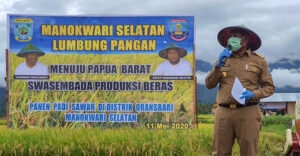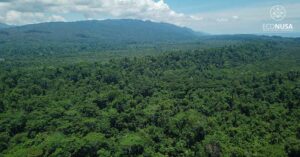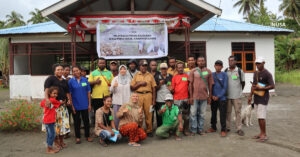
From Sarawandori Village, two cars like a Mitsubishi L200 full of agricultural tools and medical equipment and a double axle car took the EcoNusa COVID-19 Response Team to four villages, namely Ambaidiru, Manainin, Ramangkurani, and Numaman in Yapen Regency, Papua Province.
All these villages, like Sarawandori, are still in Kosiwo District, Yapen Islands. However, if Sarawandori is on the coast, the four villages are located in the Muman Mountains, in an area with an altitude between 800-1,000 masl. It took 2-3 hours through steep terrain to reach it. The road here is unpaved. Once upon a time, the pick-up car carrying the EcoNusa COVID-19 Response team got stuck in the middle of the road.
Several villagers and priests from Sarawandori accompanied the EcoNusa Team. The residents of the villages to be visited are still of the same Onate tribe as the people of Sarawandori.
Andi Leo Karubaba, a resident of the Sarawandori village, said that when they were little they used to walk from the coast to settlements in Ambaidiru.
“The road from 7 am to above can be 8 pm,” he said.
Before it was divided into four villages, the area was known as Kampung Ambaidiru. Since the 1950s, coffee has entered the region and has become widely known. Apart from coffee, Ambaidiru is also a supplier of vegetables and fruit to the city of Serui. The existing gardens use fertilizer from coffee husks. Their land is managed organically.
In Manainin Village, the EcoNusa team visited Adrianus Maniamboi’s house. For the past eight months, Adrianus has been the treasurer of the Rimba Kakopi Ambaidiru Village Unit Cooperative (KUD). These activities are interspersed with vegetable gardening, the results of which are partly consumed and partly sold to the market.
In 2017, Adrianus graduated from the Department of Agriculture, University of Papua in Manokwari, West Papua. Instead of staying in the city, he returned home to run his family’s coffee farm. His wish is to continue to maintain coffee quality with other farmers in the village.

“If we don’t continue to sweat as a coffee farmer, later he will have a spirit to cry because we, as his grandchildren, can take care of ourselves,” said the father of two children.
Regarding the impact of the pandemic on coffee farming, Adrianus said that there was one difference that was felt, namely the reduction in coffee orders. Before the COVID-19 pandemic, requests for coffee could come from outside Serui to Jakarta. However, since the pandemic, coffee has only been sold to villages in Serui.
At the house of Yafet Rawai, the Head of Manainin Village, the EcoNusa team provided support for agricultural equipment and seeds to representatives from the four villages.
There the team also met with Dorteis Artemes Mora, a young man who graduated from the Yapen-Serui Islands Nursing D3 Study Program who is now an officer of the Supporting Health Center (Pustu) in Ambaidiru. He said, even though the village was still in a green zone, vigilance was still being applied. Socialization about COVID-19 is still being carried out while providing services and treatment in the community.

“Here, people don’t wear masks, but we always remind you that if you go to the market or go to the city you are obliged to wear masks.” he said.
With the help of medical devices such as PPE, masks, face shields, gloves, and rapid test kits, Dorteis feels that Pustu’s needs are quite fulfilled. So far, the number of personal protective equipment is very limited and only available at Puskesmas.
Editor: V. Arnila Wulandani & Leo Wahyudi







